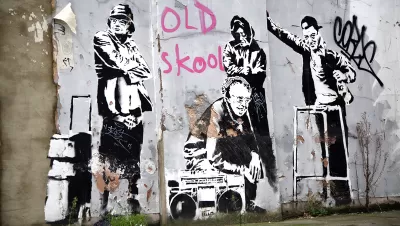A feature article in Marketwatch describes a future for retirement communities that look more like WeWork than the golf course-adjacent exurban communities of the 20th century.

Rachel Koning Beals writes a feature-length article on the evolving priorities of aging seniors exploring the housing market for new kinds of retirement community options.
The current generation of aging Baby Boomers is set to completely redefine the market for retirement communities. Not all of the potential for change for happy reasons, many are facing "financial burdens associated with living longer than prior generations did," according to Beals—a reality "that challenges a U.S. formula for senior housing that hadn’t changed much in decades."
yet, there are reasons for optimism that a new approach to retirement could see benefits for the aging generation. Beals explains:
Yet if the demanding, savvy-consumer baby boomers taking over where their Depression-era parents left off have their say on where and how they live as they age — and geriatrics experts say they do — the era of grin-and-bear-it acquiescence is no more.
Many of today’s best available senior-housing options are really a nod to the past: higher-density locales, homes suited for multiple generations, and community support and stimulation that keeps retirees active and healthy.
Beals notes that many surveys and real estate trends show a back-to-the-city movement for aging seniors, mimicking the preferences of Millennials and Generation Z, but perhaps for different reasons.
Technology is also enabling freedom to live in urban environments like never before: "Technology, especially leveraging the sharing economy, can help satisfy boomers who want to age in place or are rightfully demanding more from their assisted-living options. (Think of services spanning Uber or Lyft rides to in-home wellness programming.)"
FULL STORY: The sharing economy is coming for your retirement

Planetizen Federal Action Tracker
A weekly monitor of how Trump’s orders and actions are impacting planners and planning in America.

Maui's Vacation Rental Debate Turns Ugly
Verbal attacks, misinformation campaigns and fistfights plague a high-stakes debate to convert thousands of vacation rentals into long-term housing.

Restaurant Patios Were a Pandemic Win — Why Were They so Hard to Keep?
Social distancing requirements and changes in travel patterns prompted cities to pilot new uses for street and sidewalk space. Then it got complicated.

In California Battle of Housing vs. Environment, Housing Just Won
A new state law significantly limits the power of CEQA, an environmental review law that served as a powerful tool for blocking new development.

Boulder Eliminates Parking Minimums Citywide
Officials estimate the cost of building a single underground parking space at up to $100,000.

Orange County, Florida Adopts Largest US “Sprawl Repair” Code
The ‘Orange Code’ seeks to rectify decades of sprawl-inducing, car-oriented development.
Urban Design for Planners 1: Software Tools
This six-course series explores essential urban design concepts using open source software and equips planners with the tools they need to participate fully in the urban design process.
Planning for Universal Design
Learn the tools for implementing Universal Design in planning regulations.
Heyer Gruel & Associates PA
JM Goldson LLC
Custer County Colorado
City of Camden Redevelopment Agency
City of Astoria
Transportation Research & Education Center (TREC) at Portland State University
Jefferson Parish Government
Camden Redevelopment Agency
City of Claremont




























